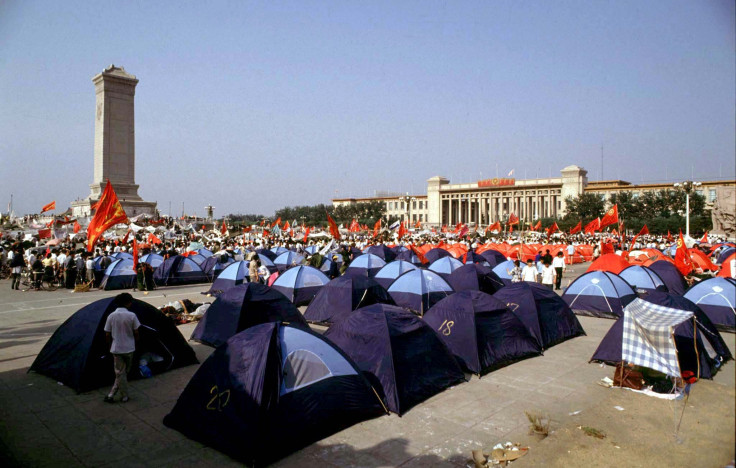How The Chinese Communist Party Turned Tiananmen Square To Its Advantage

Twenty-five years ago Wednesday, China’s supreme leader, Deng Xiaoping, ordered the People’s Liberation Army to fire upon demonstrators occupying Beijing’s Tiananmen Square, initiating a massacre that caused the deaths of hundreds -- some estimates say thousands -- of Chinese citizens. The killings brought an abrupt end to sustained, student-led protests in both Beijing and provincial capitals throughout the country that had seriously threatened the Communist Party’s hold on power for the first time since 1949.
As television crews broadcast footage from Beijing to audiences worldwide, the Tiananmen Square massacre became a permanent stain on the reputation of the Chinese Communist Party. The United States government -- among many others -- condemned the attacks and briefly suspended ties with China. In Hong Kong, then one of the last remnants of the British Empire, hundreds of thousands gathered in protest, an action that has repeated itself each year on the massacre’s anniversary. And as the 25th anniversary approaches, the international media have devoted considerable attention to commemorating the massacre and examining its consequences.
But there’s one place where the anniversary of Tiananmen Square will pass in silence: China itself. The Communist Party has completely expunged the massacre from the country’s historical record: High school students do not learn of the killings, and today only a small percentage of the country’s university students -- the exact demographic that led the protests -- is even aware of what happened. When asked about Tiananmen Square at a recent gathering with reporters, Foreign Ministry spokesman Hong Lei made it clear that, at least within China, no more discussion of the event is needed.
“The Chinese government long ago reached a conclusion about the political turmoil at the end of the 1980s.”
This wasn’t always the case: In the months leading up to Tiananmen Square, China’s leadership was divided on the question of how to deal with the students. And even in the immediate aftermath, many observers expected that the Communist Party, like its ideological brethren in Eastern Europe, would soon disappear. That the Communist Party would remain, 25 years later, arguably as powerful as ever, was by no means obvious at the time.
How has the party managed to achieve this feat? To consider this question, it’s worth looking at the experience of the Soviet Union, and its leader at the time: Mikhail Gorbachev. In the West, Gorbachev is often regarded as a hero for his economic and political reforms, which helped bring about the end of the Cold War. But the Chinese government views Gorbachev as a disaster. Following the collapse of the Soviet Union, Russia lost an enormous amount of territory and saw vital assets -- such as lucrative oil and gas interests -- stripped from state control. This is a fate Beijing was determined to avoid. In a leaked speech given at the beginning of his tenure, current Chinese President Xi Jinping presented a harsh interpretation of the former Soviet leader:
Gorbachev announced the disbandment of the Soviet Communist Party in a blithe statement. A big party was gone just like that. Proportionally, the Soviet Communist Party had more members than we do, but nobody was man enough to stand up and resist.
Deng Xiaoping’s order to suppress the demonstrations was more than just a reaction to a crisis. It was also a deliberate choice to pursue economic reform at the expense of political liberalization. And in many real ways, this approach has worked: Economic reforms have allowed hundreds of millions of Chinese citizens to lift themselves out of poverty, and China’s middle-class enjoys personal freedoms -- such as the right to choose their own profession and travel abroad -- that the Tiananmen generation could only dream of. And on the national level, China’s three decades of almost uninterrupted growth has turned its economy into the world’s second-largest, one poised to overtake the United States (in terms of purchasing power parity) perhaps as soon as this decade.
China’s growing power has also allowed Beijing to deflect continued criticism of its human rights record. In 1992, pressure from human rights organization successfully scuttled Beijing’s bid to host the 2000 Summer Olympic Games, a cause of deep anger and embarrassment to the Communist Party. Just two years later, however, President Bill Clinton’s decision to grant China favorable trade status signaled that Washington could not ignore Beijing’s growing importance to the global economy, and Beijing got the 2008 Summer Games. In 2012, a Pew Research poll confirmed this shifting attitude: Human rights concerns rank only sixth on the list of matters of concern with China from the United States after debt, jobs, trade, cyber-attacks, the environment and military power.
China is still a country beset by problems, not least of which is the continuing need -- at great expense -- to suppress domestic dissent. But it is difficult to dispute the fact that, 25 years after overcoming an existential threat, the Chinese Communist Party enjoys a legitimacy and stability that seemed impossible in the aftermath of Tiananmen Square.
© Copyright IBTimes 2024. All rights reserved.





















